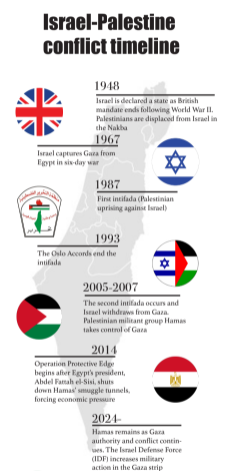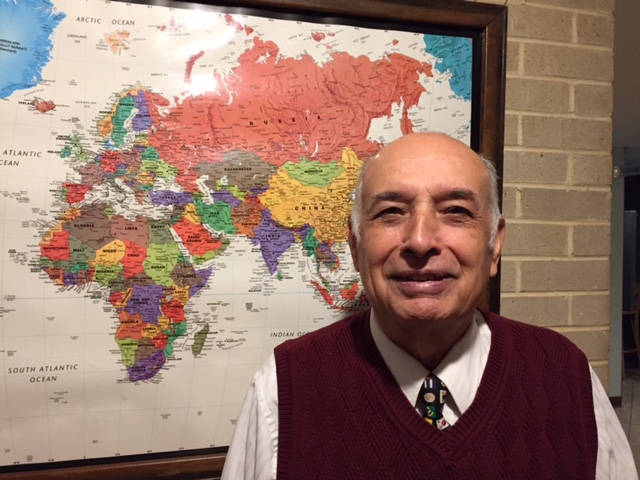A Palestinian perspective: Q&A with Reverend Fahed Abu-Akel
Reverend Fahed Abu-Akel is a Palestinian Arab Christian who grew up in Kafr Yasif, a village 25 miles northwest of Nazareth in the Galilee area, in what is now Israel. Abu-Akel has a bachelor’s degree from Southeastern University, a Master of Divinity from Columbia Theological Seminary and a Doctor of Divinity from the McCormick Theological Seminary. He is also the founder of Friends of the Palestinian Medical Relief Society (PMRS), as well as an active advocate of the Mariam Foundation, a non-profit supporting Palestinian cancer patients. Art director Eva Lucero sat down with Abu-Akel to discuss the current Israel-Hamas conflict.
Q: Can you elaborate on your connection to Palestine?
A: Anytime I see the children of Gaza, I see myself running around with my dad, five sisters and two brothers. Suddenly I look at my mother, waving; I can see her right now like on a television screen in front of me. We did not go north toward Lebanon (during the displacement of Palestinians from what is now Israel), we went east toward the mountains to a place called Eureka. We were put in a makeshift refugee camp with scout tents, and we were there for about two or three months. Mother not coming with us always haunted me, and as a teenager, I needed to ask her why she did not go with us. My mother said, “Take the children, you can protect them. I’m going to stay here. This is my home, our land and our church. They need to kill me in my home.” So to me, when I think about my mother, I think about Palestinian mothers, Palestinian grandmothers and Palestinian sisters who are the backbone of the steadfastness of the Palestinian people to stay united in resistance. My mother is a symbol of resistance.
Q: Can you elaborate on the settler-colonial mentality?
A: Zionism is a settler-colonial ideology that has nothing to do with Judaism, Christianity and Islam. Settler-colonialism says, “I want the land. I need to get rid of the people and use the resources.” The Zionist Movement was created by journalist Theodor Herzl. He responded to something called, in the European context, the “Jewish question” (a debate pertaining to the appropriate treatment of Jewish individuals). Why? Because the Jewish people in Portugal were persecuted, and again in Spain, and again in France, and again in Russia, over and over. Finally, the Holocaust — killing 6 million Jewish people — should never happen to anybody again. They say ‘never again,’ not only for Jews, but never again for anybody else.
Q: How is the war affecting America?
A: What is happening in Gaza is giving Israel and the U.S. a bad name in the long run. The young people in the U.S. and the young people around the world are saying to the older adults, “I’m not going to listen to you anymore. Justice is justice regardless of who we are.” That’s the Jewish voice for peace. The progressive people in the Jewish community and the Christian community give me hope to continue to struggle for justice.
Q: How do you think social media is affecting the current conflict?
A: Social media is shifting the narrative for the first time. We are turning the world against Israel and turning the world against the U.S. policy. That’s the reason, as Americans, we need to ask our senators, our representatives and our president for a ceasefire. Justifying killing children, women and innocent people by saying they are fighters is a flat lie and needs to stop. At this point in history, social media is going to flush out our hypocrisy.
Q: What can young people, or anyone who wants to support Palestine, do in their communities?
A: We need to support freedom of speech on our campuses. We also need our young people to depend on alternative media. For example, www.ifamericansknew.org, will give you everything you need to know. The youth needs to be pro-Israeli and pro-Palestinian. This win-lose scenario is not going to help us, it’s already been tried many times and failed.
Q: Do you think people understand the history of the conflict?
A: We always need to hear both narratives. The Israeli-Jewish narrative is clear in the synagogue, in the church, in the newspaper, on television. It’s very clear in our psyche. But what I say to you in less than three minutes, my Palestinian narrative in the psyche of Americans, high schoolers, college students and adults, is a dead narrative. That means we need to tell our story again and again.
Q: Why do you believe some Americans support the war?
A: I’m not able to understand why the majority of Americans are not able to condemn what Israel is doing. The first wrong is wrong and needs to be condemned, but on what basis do we continue, as Americans, supporting the state of Israel to continue killing Palestinians? Sometimes we are clear about the security of Israel, but we care less about the security of the Palestinians. When it comes down to military might, there is no symmetry; Israel is a nuclear power. Both sides must end the conflict. The problem is that no one can understand the reality of what is happening in Gaza. As of today, we have more than 100,000 people injured and close to 30,000 people, not including the ones under the rubble, who are murdered. In any war, the ones who suffer are the children and the women. You cannot understand what Israel is doing in Gaza without understanding the settler-colonial mentality.
Q: Do you have anything more to add?
Religion brings us closer to God, but if religion is going to force me to hate and kill my neighbor, something is wrong in my religion. I don’t care if it’s Judaism, Christianity, Islam, Hinduism or Buddhism, we cannot use it in the 21st century. That kind of violence is against my theology.





